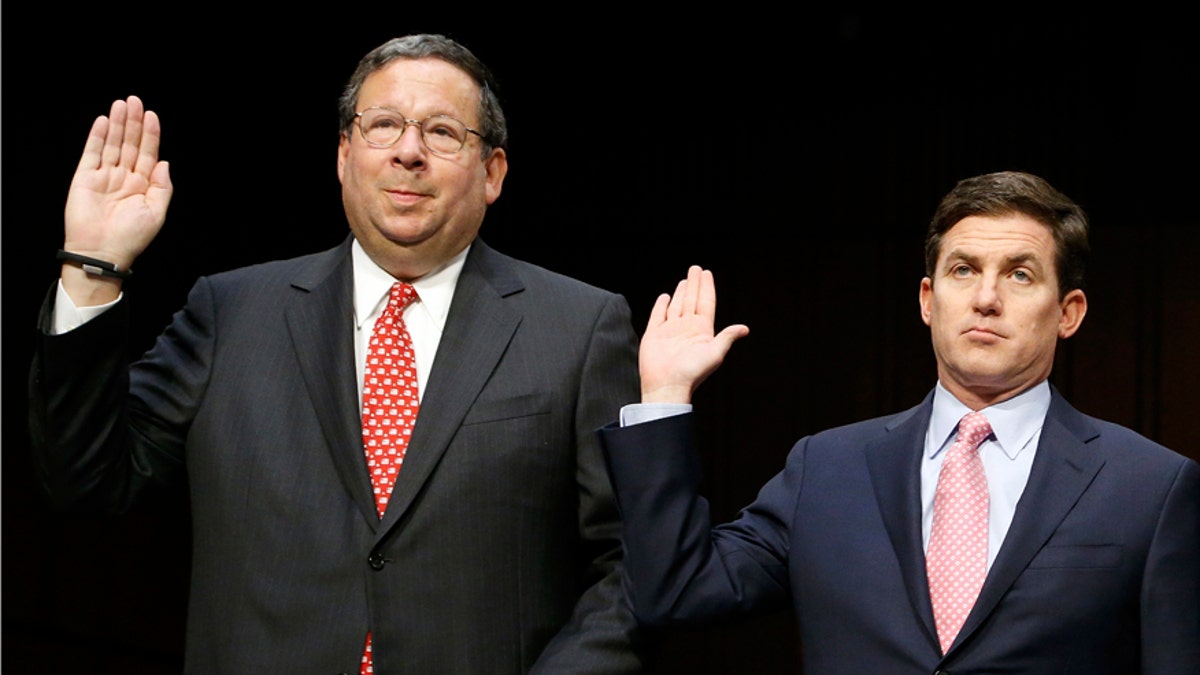
Comcast Executive Vice President David Cohen (L) and Time Warner Cable Inc. Executive Vice President and CFO Arthur Minson (R) are sworn in to testify before a Senate Judiciary Committee hearing on the Comcast-Time Warner Cable merger on Capitol Hill in Washington April 9, 2014. Executives from Comcast Corp and Time Warner Cable Inc are expected to defend their plan to merge as they go before the Senate Judiciary Committee on Wednesday, the first hearing since the $45.2-billion deal was announced in February. (Reuters)
Just when you thought you could lower or eliminate your cable bill by buying an Amazon Fire TV or a Roku Streaming Stick, Comcast and Time Warner Cable's proposed merger promises to crush your streaming media dreams. Like the focus of so many technologies and businesses today, this merger isn't about TV, it's about the Internet.
On Tuesday, Comcast filed a mandatory application with the Federal Communications Commission. Along with an accompanying letter, it amounts to a defense of the $45.2 billion merger of the No. 1 and No. 2 cable companies in the U.S. On Wednesday, company representatives will face antitrust questions from the Senate Judiciary Committee.
While many consumers will shudder at the idea of a single company mandating fees to roughly 70 million TV subscribers, the bigger issue in the future is likely to be whether a single company should control access to the Web for millions of Americans who essentially have no high-speed alternative. As our lives increasingly move online – from banking and shopping to streaming music and video entertainment – he who controls the online pipeline ends up controlling everything.
Time Warner and Comcast have been fretting about this development for years. Comcast has diversified some of its interests by purchasing NBCUniversal, beefing up high-speed Internet access to its customers and investing in online services like Hulu. But Time Warner has lagged noticeably in this area, and part of Comcast's pitch to regulators is that it will improve high-speed Internet access for frustrated Time Warner customers.
Comcast and Time Warner are arguing that the merger is necessary in order to compete for TV viewers against the likes of Verizon, Amazon, Apple and Google. The trouble is, the merged company would be able to compete all too well, controlling the competition by controlling the broadband pipes to over 40 percent of the U.S. If you think handing over the reins of the Internet to an international group is a bad idea, handing over control of much of America’s Internet access to a single business is even worse.
Not surprisingly, a broad swath of consumer interest groups – ranging from sports fans to parents to women's organizations – is opposed to the merger. A collection of 50 public interest groups submitted a letter to FCC Chairman Tom Wheeler and to Attorney General Eric Holder this week urging them to block the deal, saying it "would turn Comcast into our communications gatekeeper, able to dictate the cost and content of news, information and entertainment." The groups pointed out that Comcast has a record of rapidly raising prices, having boosted basic cable fees in some markets by as much as 70 percent over the last four years.
But it's not the 6-o'clock news or "American Idol" that everyone is worried about. It's access to the Internet.
Demonstrating just how rapidly Web services are expanding – and threatening traditional cable TV – were the recent introductions of Roku's $50 Streaming Stick and Amazon's $99 Fire TV. Both products, as well as Google's $35 Chromecast and Apple’s $99 Apple TV, are aimed at delivering video and music programming directly to viewers' living rooms over the Internet. Netflix, the preeminent streaming service, now accounts for roughly 30 percent of all Internet traffic. In fact, these services are so popular that, along with HBO, Showtime and other premium channels, Time Warner Cable itself streams its channels to the Roku player. (Of course, not all live channels are on the Roku gadgets, and you have to be a paying cable TV subscriber to watch the Time Warner channels.)
It's the Web eyeballs Comcast and Time Warner are after, not the dwindling broadcast TV audience. So Comcast's arguments this week about television access and the lack of overlap in cable television service in the U.S. are a red herring. So this merger is really all about Internet service, and Comcast and Time Warner know it. If a bloated cable Internet provider can control a large segment of the population’s access, it can also demand bloated fees and determine which Internet services get priority (once temporary restrictions on Comcast are lifted).
The bottom line is still about money, and history tells us our bills will go up if the merger goes through. But the price hikes will be all about getting online, not watching cable TV.
